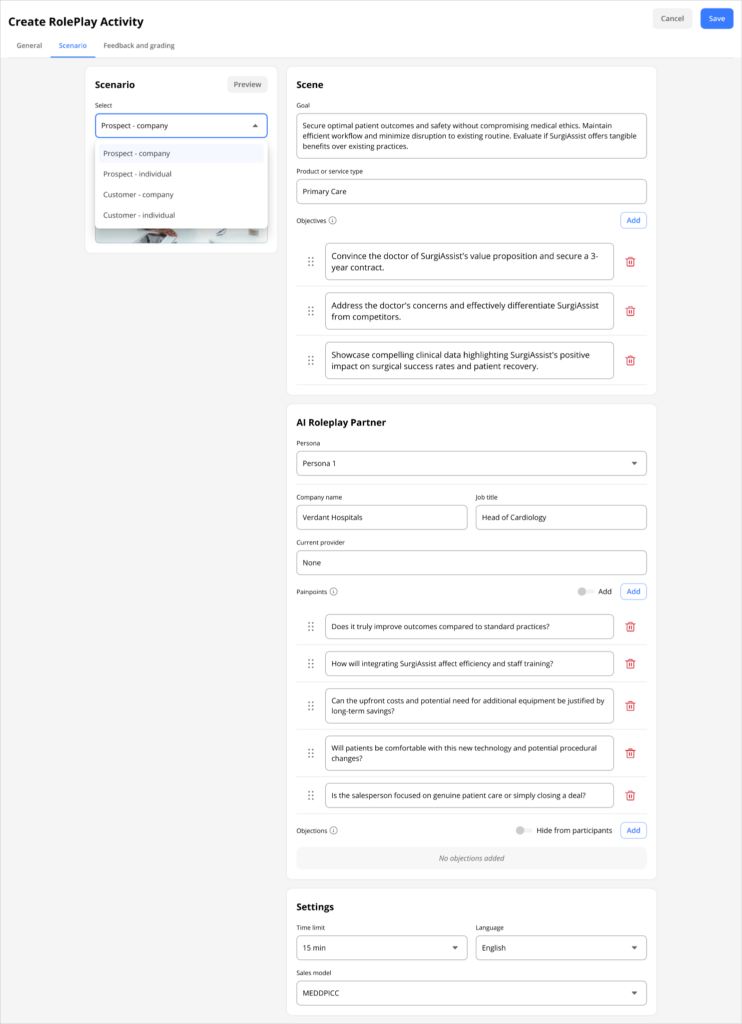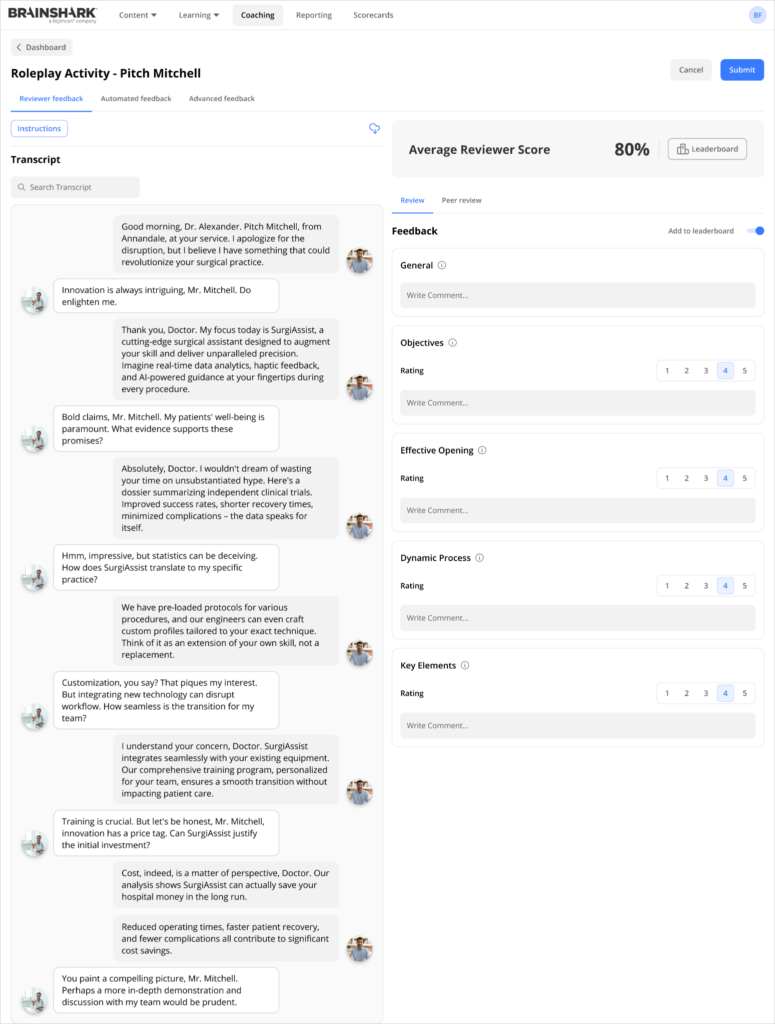Ever notice how B2B buying committees are starting to look like the cast of a reality TV show?
You’ve got the skeptic who treats every product claim like it’s a conspiracy theory. The enthusiast who’s already planning the implementation before seeing a demo. The analytical type who wants to see the math behind the math. And don’t forget the one who’s mastered the art of saying absolutely nothing while nodding politely.
For enablement and sales managers, preparing reps for this colorful cast of characters is like preparing actors for an improv show. Except the stakes are higher, the audience is tougher, and there’s actual revenue on the line.
Traditional roleplaying might help, but who has time to act out every possible scenario? (Spoiler alert: no one). Good news: Bigtincan’s RolePlayAI just made the endless hunt for reliable practice partners obsolete. It’s your team’s always-on coach that shape-shifts into any buyer persona at the click of a button and never says the same thing twice.
No scheduling required, no awkward practice sessions, just pure confidence-building practice whenever your reps need it.
Now, let’s dive into these buyer personalities and see how AI practice sessions can turn your reps into experts of adaptation — no matter who shows up to the meeting.
7 of the most common buyer personalities shaping your B2B deals
Success in B2B sales hinges on your team’s ability to adapt their approach for different stakeholder personalities. Each buying committee member brings unique concerns, communication preferences, and decision-making styles to the table.
With AI-powered practice, your reps can turn challenging buyer interactions into closed deals and move opportunities forward faster.
Here’s how.
1. The skeptical buyer: Your toughest critic
Meet the buyer who’d fact-check a weather report. The skeptical analyst approaches every sales conversation with a healthy dose of “prove it” energy, questioning claims and demanding evidence before showing even a hint of interest.

What makes them tick
The skeptical buyer is the ultimate “show me, don’t tell me” personality. They reserve judgment until they see concrete proof, questioning every claim with the tenacity of a detective at a crime scene. Their favorite phrase? “Interesting, but…” followed by increasingly probing questions. They need validation from trusted third-party sources and value hard data over compelling storytelling.
How to win them over
Remember that skepticism isn’t rejection — it’s an invitation to prove your worth. These buyers aren’t trying to make your life difficult — they’re doing their due diligence. And honestly? That’s exactly what they should be doing with their company’s budget.
Here’s how to turn their skepticism into trust:
- Come armed with third-party validation (think analyst reports, case studies, and hard data)
- Be transparent about both capabilities and limitations
- Follow up every claim with immediate proof
- Welcome their questions (they’re actually giving you a roadmap to closing the deal)
The key is approaching each interaction as an opportunity to build credibility through evidence. These buyers often become your strongest advocates once convinced — precisely because they’ve done their due diligence and truly believe in your solution. Their thorough vetting process, while challenging, ultimately leads to more stable, long-term partnerships.
Practice makes confident
Skeptical buyers challenge every claim with questions like “What’s your actual implementation timeline?” and “Can you prove those ROI numbers?” Your reps need specific strategies for handling these detailed inquiries while maintaining control of the conversation.
Sound challenging? It is. But here’s the good news: practice doesn’t have to mean putting reps in the hot seat in front of their peers.
Here’s what sellers can accomplish with AI practice:
- Backing up claims with concrete evidence (“Here’s a case study showing a 3-month implementation”)
- Turning objections into opportunities (“That’s a great question about security – let me show you our SOC 2 certification”)
- Managing tough technical questions (“Let me walk you through our architecture diagram”)
- Handling pricing scrutiny (“Here’s how we calculate ROI for companies like yours”)
- Building credibility through validation (“We can connect you with three references in your industry”)
Through AI sales simulation, reps develop muscle memory for handling tough questions with evidence-based responses. They’ll learn to anticipate objections, prepare supporting materials in advance, and guide even the most skeptical buyers toward confident purchase decisions.
2. The enthusiastic buyer: Riding the wave of excitement
This buyer’s energy could power a small city. They’re not just interested — they’re already mentally implementing your solution before you’ve finished your intro. While their enthusiasm is infectious (and honestly, pretty fun), it can sometimes mask potential roadblocks to closing the deal.

What makes them tick
The enthusiastic buyer is your most attentive listener. They dive deep into conversations about features and applications, actively connecting dots between your solution and their needs. They’re quick to share personal experiences, appreciate your expertise, and get genuinely excited about innovation.
These buyers often make positive remarks throughout presentations and aren’t shy about expressing their appreciation for both your product’s innovation and your knowledge about it.
How to win them over
While enthusiasm is a gift, it needs to be channeled effectively to turn interest into action. These buyers are already sold on the dream — your job is to help them turn that dream into reality while ensuring no critical evaluation steps are skipped along the way.
- Channel their energy into productive discovery conversations
- Document their enthusiasm and specific interest points for later
- Guide their excitement toward practical next steps
- Keep detailed notes of all their ideas and requirements
- Help them build a business case for other stakeholders
Their enthusiasm is a powerful asset, but it needs to be grounded in reality. The key is to match their energy while steering the conversation toward concrete outcomes. Remember, excitement doesn’t always equal authority to purchase — these buyers often need help translating their enthusiasm into a compelling case for other decision-makers.
Practice makes focused
Enthusiastic buyers often say yes to everything — features, benefits, pricing — but that excitement doesn’t always translate to signed contracts. Your reps need to learn how to guide these high-energy conversations toward actual buying decisions while uncovering critical details like budget authority, timeline, and potential roadblocks.
Need to help your reps turn enthusiastic “yeses” into signed contracts? Give them space to perfect the art of qualification without killing the buzz by having them practice with AI.
For instance, they’ll learn to:
- Ask qualification questions without dampening excitement (“That’s great that you love the analytics dashboard! Who else needs to evaluate this feature?”)
- Uncover actual decision-making authority (“Who else typically joins you in technology purchases like this?”)
- Convert product excitement into concrete next steps (“Let’s schedule a technical review with your team next week”)
- Document enthusiasm in ways that help build business cases (“Would you be willing to share that ROI example with your finance team?”)
- Set realistic timelines while maintaining momentum (“What’s your typical purchasing process for new software?”)
Watch your reps transform from excitement enablers into deal closers. They’ll understand the delicate balance of maintaining momentum while gathering the critical details needed to turn enthusiastic champions into powerful allies who can actually push deals across the finish line.
3. The indifferent buyer: Breaking through the wall of “maybe later”
Meet the buyer who’s perfected the art of polite disinterest. They respond with brief “mm-hmms” and “we’ll sees,” while probably checking their email or multitasking during your presentation. But don’t mistake their apparent lack of interest for a dead end — they might be hiding valuable pain points behind that poker face.

What makes them tick
The indifferent buyer is a pro in non-committal responses. They show minimal interest in your product, often multitask during meetings, and need constant prompting to stay on topic. Their short, vague answers could mean anything from “I’m not the right person” to “I haven’t seen anything worth my attention yet.” The challenge isn’t just keeping them focused — it’s uncovering whether their indifference masks real potential.
How to win them over
Before you write off these buyers as lost causes, remember: indifference often hides unspoken objections or unexplored pain points. Your mission is to break through that wall and find what actually matters to them, so:
- Ask unexpected questions about their business challenges
- Share relevant industry insights they might not know
- Connect your solution to their specific KPIs and metrics
- Keep conversations focused and high-value
- Use pattern interrupts to snap them out of autopilot mode
The key is to shift from presenting features to uncovering problems worth solving. When you hit on something that matters to them, you’ll notice their energy level change instantly. That’s your cue to dig deeper and explore that area of interest.
Practice makes persistent
Indifferent buyers respond with phrases like “we’re good for now” or “maybe next quarter” without sharing real feedback. Your reps must learn specific techniques for uncovering whether there’s genuine potential behind the disinterest.
Done watching your reps get stonewalled by “maybe later” responses? Give them a playground to test different approaches for cracking the code of indifference:
- Converting vague responses into real insights (“What solutions are you currently using for this?”)
- Uncovering hidden pain points (“How much time does your team spend on manual reporting?”)
- Using pattern interrupts effectively (“Many companies like yours didn’t realize they had this problem until…”)
- Qualifying real potential (“What would need to change for this to become a priority?”)
- Creating urgency from indifference (“What’s the cost of not addressing this issue now?”)
Pretty soon, your reps will spot the difference between true indifference and hidden opportunity at first glance. They’ll know exactly when to dig deeper and when to move on, saving precious selling time while uncovering golden opportunities other reps miss completely.
4. The analytical buyer: When details make the deal
The analytical buyer, also known as the reflective thinker, treats every purchase like a scientific study. They want to see the data behind your claims, understand your methodology, and dig into the technical specifications most people skip. For them, a good story isn’t just nice to have — it needs to be backed by solid evidence.

What makes them tick
The analytical buyer lives in the details. They require comprehensive information about every aspect of your solution, from technical specifications to implementation processes. They’re methodical in their evaluation, often creating detailed comparison spreadsheets and asking questions that dig several layers deep. Surface-level answers won’t cut it — they need to understand not just what your solution does, but exactly how it does it.
How to win them over
Success with analytical buyers requires a perfect balance of thoroughness and clarity. These buyers appreciate a systematic approach that matches their own decision-making process.
For example:
- Present information in a logical, structured format
- Back every claim with specific data points and examples
- Provide detailed documentation upfront
- Be prepared to explain your methodology
- Show your work — walk through the math behind ROI calculations
The key is matching their analytical mindset with equally thorough preparation. When they ask detailed questions, treat it as an opportunity to showcase your depth of knowledge. These buyers respect expertise and appreciate sellers who can meet them at their level of technical understanding.
Practice makes precise
Analytical buyers ask detailed questions like “What’s your API’s average response time?” and “Can you walk me through your security architecture?” Your reps must know how to explain technical details while connecting them to business value.
But explaining complex tech to detail-oriented buyers isn’t exactly a walk in the park. Your reps need to nail the technical talk while keeping it digestible, spot the glazed-over eyes before they turn into objections, and turn specs and features into real business wins. Oh, and they need to do all this while fielding rapid-fire questions about capabilities they might not have reviewed in weeks.
Sound fun? Maybe not. But that’s exactly why practice is crucial. And we’re not talking about those awkward roleplaying sessions that leave everyone checking their watches.
Here’s what your reps can actually do with AI practice:
- Break down complex features clearly (“Our API averages 200ms response time, which means real-time updates for your users”)
- Connect specs to outcomes (“This security architecture means you’ll meet compliance requirements in half the time”)
- Handle technical comparisons (“Here’s how our solution compares to others in terms of scalability”)
- Manage detailed objections (“Let me show you our performance benchmarks for enterprise workloads”)
- Transition from features to value (“These specs translate to 40% faster processing for your team”)
By using AI sales simulation, reps learn to navigate technical conversations with confidence. They’ll develop expertise in presenting complex information clearly, backing claims with data, and showing how technical capabilities solve specific business problems.
The best part? Your reps can take all the time they need to get comfortable with the technical stuff. No pressure, no judgment — just pure practice until they can handle even the most thorough technical examination like they wrote the spec sheet themselves.
5. The conversationalist relationship builder: When trust matters more than features
This buyer isn’t impressed by specs and stats alone — they want to know who they’re doing business with. They share personal stories, ask about your experience, and make decisions based on gut feel as much as data. But don’t mistake their friendly demeanor for an easy close.

What makes them tick
The relationship-oriented buyer values personal connection above all. They want to know your team will have their back long after the contract is signed. These buyers often start conversations with personal questions, share their own experiences freely, and judge your solution partly on how well they connect with you. They’re looking for a partner, not just a vendor.
How to win them over
Success with relationship buyers means striking the right balance between personal rapport and professional value. These buyers need to trust you before they’ll trust your solution, so:
- Lead with genuine curiosity about their background and experience
- Share relevant stories from your own experience
- Connect product benefits to their personal goals
- Demonstrate long-term commitment to their success
- Show how your support team becomes an extension of theirs
The key is authenticity. These buyers can spot a fake smile from a mile away, so your reps need to learn how to build genuine connections while staying focused on business outcomes.
Practice makes personal
Relationship buyers often ask questions like “How long have you been with the company?” and “What made you choose to work here?” Your reps must learn authentic relationship building while keeping conversations productive.
Want your reps to build genuine connections without the awkward “getting to know you” small talk? Let them practice relationship-building with AI that actually drives deals forward:
- Building rapport naturally (“I noticed you’ve been in the industry for 10 years – what changes have you seen?”)
- Transitioning smoothly to business topics (“Your experience reminds me of another client who solved that challenge by…”)
- Balancing personal connection with purpose (“I appreciate you sharing that. It helps me understand how we can better support your goals”)
- Handling trust-testing questions (“Here’s why I personally believe in our solution…”)
- Maintaining relationships post-sale (“I saw your company’s recent announcement – congratulations on the expansion”)
With enough practice, your reps will master authentic relationship building that drives results. They’ll know exactly when to share a personal story and when to pivot to business value, creating lasting partnerships instead of surface-level connections.
6. The price-focused, direct negotiator: Beyond the budget battle
Meet the buyer who jumps straight to “What’s this going to cost us?” They’re focused on numbers from the get-go, comparing prices before features, and scrutinizing every line item. But treating price objections as pure bargaining moves can cost you deals that could’ve been won with value-based selling.

What makes them tick
The price-focused buyer approaches every purchase with budget constraints top of mind. They’re often under pressure to cut costs while improving results, leading to intense scrutiny of any new investment. These buyers typically start conversations by discussing pricing models, want to understand all costs upfront, and frequently benchmark against competitor pricing. Their questions revolve around ROI, TCO, and finding ways to reduce initial investment.
How to win them over
Success with price-focused buyers requires shifting the conversation from cost to value without dismissing their budget concerns. Your reps must understand value-based selling while respecting financial constraints, so:
- Address pricing concerns head-on with ROI calculations
- Break down costs in terms of business impact
- Highlight the cost of doing nothing
- Show flexible pricing options that align with their budget cycle
- Demonstrate proven cost savings from similar customers
The key is helping them see your solution as an investment rather than an expense. These buyers need concrete evidence that your solution will pay for itself through measurable business improvements.
Practice makes profitable
Price-focused buyers open with questions like “What’s your pricing model?” and “Can you match Competitor X’s price?” Your reps should know how to redirect price discussions toward value while maintaining deal momentum.
Tired of watching your reps cave on pricing or lose deals to “no budget”? Give them a pressure-free AI environment to practice:
- Reframing price objections (“Let me show you how customers typically see ROI within 90 days”)
- Quantifying value clearly (“Based on your volume, this would save $100K annually”)
- Handling discount requests strategically (“Instead of reducing the price, let’s explore our flexible payment options”)
- Using competition to advantage (“While their base price is lower, here’s why customers choose us”)
- Building business cases (“Here’s how similar companies justified the investment”)
Your reps will develop a sixth sense for turning price-focused prospects into value-focused buyers. No more sweating through tough pricing conversations or losing deals on cost alone — they’ll know exactly how to demonstrate value that justifies investment while working within budget constraints to structure winning deals.
7. The disgruntled critic: Winning over the battle-worn buyer
Frustration is the Disgruntled Critic’s default setting. They’re quick to reference past failures and demand to know why this time will be different. Every promise is met with suspicion, and their questions often circle back to unresolved issues. While they may seem combative, they’re actually looking for accountability and proof that your solution can deliver where others have fallen short.

What makes them tick
The Disgruntled Critic enters the room with a chip on their shoulder, fueled by frustration from past letdowns. They wear their skepticism like armor, protecting themselves from more disappointment. Conversations with them are peppered with interruptions like, “We’ve tried this before,” or “That didn’t work last time.” Their questions probe deeply into your ability to deliver, often focusing on implementation hurdles and accountability.
Their favorite phrases? “How are you different from X company?” and “Why should I believe this will work for us?” They’re not just skeptical — they’re battle-worn, wary of investing more time, money, and energy into yet another solution that might fail.
How to win them over
The Disgruntled Critic isn’t resistant to change — they’re resistant to more of the same. Their mistrust isn’t personal; it’s the natural outcome of too many broken promises. The good news? This type of buyer values accountability above all else. If you can prove you’re willing to be transparent and follow through, you have a real chance to win them over.
Here’s how to transform their doubt into trust:
- Validate their past experiences and show you’re listening
- Clearly explain how your solution is different from what they’ve tried before
- Share a detailed roadmap with clear milestones, check-ins, and ways to measure success
- Case studies, proof of ROI, and customer testimonials go a long way here
- Instead of avoiding the hard questions, answer them with specifics and be transparent about potential challenges
Winning over the Disgruntled Critic requires empathy and precision. They’re not looking for buzzwords or platitudes — they’re looking for someone who can take ownership and deliver results. If you can show them you’re not just selling, but truly partnering with them, you’ll earn their trust.
Practice makes prepared
Disgruntled Critics don’t pull punches. They’ll hit you with tough questions like, “How do I know this will actually work?” and “What happens if we don’t hit the timeline?” Your reps need strategies to navigate these high-pressure moments while maintaining composure and credibility.
With AI-powered sales practice, reps can master handling these tough conversations:
- Acknowledging past frustrations. (“I completely understand why you’re cautious. Let me explain how we’ve addressed that concern with other customers”)
- Clarifying implementation steps. (“Here’s our detailed project plan, including what we’ll do if there’s a delay”)
- Addressing doubts with data. (“Here’s a report from a customer in your industry who faced similar challenges and saw results in six months”)
- Proving accountability. (“We include bi-weekly progress reviews to ensure we stay on track”)
- Redirecting focus to solutions. (“I hear your concerns. Let’s talk about how we’ll make sure this doesn’t happen again”)
By practicing these scenarios, reps build confidence in guiding conversations with Disgruntled Critics. They’ll learn to turn frustration into engagement and skepticism into trust, paving the way for successful, long-term partnerships.
Turn practice into readiness with RolePlayAI
While Genie Assistant helps your revenue teams work smarter across tasks like drafting emails and creating training content, RolePlayAI focuses on one crucial challenge: mastering buyer interactions. Our enablement AI tools are saving sales teams at least two hours each day — time they can spend building real relationships with customers instead of practicing in awkward, half-hearted roleplay sessions.
Here’s how RolePlayAI works can prepare your salespeople for any buyer personality they may encounter.
Set up realistic scenarios in minutes

Choose your buyer’s personality type, set their objectives and pain points, and create practice scenarios that mirror real-world sales situations. Whether you’re preparing for a skeptical CTO or an enthusiastic Enablement champion, you can make the practice feel real.
Practice natural conversations

Your reps can participate in dynamic text or audio conversations where the AI adapts to what they say. No scripted responses or predictable patterns — just realistic back-and-forth that helps reps think on their feet.
Track and improve

Managers can review practice sessions and provide feedback just like any other coaching activity. Reps can practice independently until they’re ready for review, building confidence without pressure.
Ready to help your team learn to maneuver through sales calls with different buyer interactions?
Prepare for every personality, win more deals
Every B2B deal has its cast of characters. But success isn’t about memorizing scripts for each personality type — it’s about giving your reps the confidence to adapt their approach on the fly. Whether they’re facing a skeptical analyst who questions every claim or an enthusiastic champion who needs help building a business case, your team needs to be ready.
That’s where practice makes the difference between closed deals and missed opportunities. And not just any practice — the kind that lets your reps experiment freely, fail forward, and develop their own winning playbook for every personality they’ll encounter.
